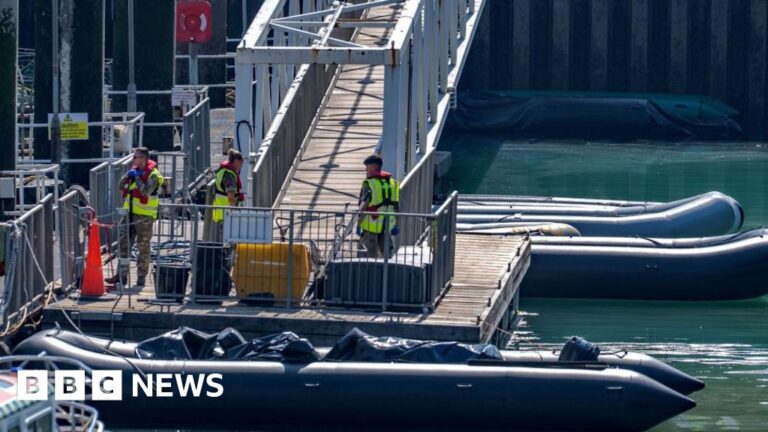Some asylum claimants who arrived in the UK in small boats or in the back of lorries could be electronically tagged under a new Home Office trial.
A 12-month trial could apply to adults due to be removed from the UK after arriving via what the government calls “dangerous or unnecessary” routes.
Boris Johnson said it was important to “make sure asylum seekers can’t just vanish into the rest of the country”.
Critics say the plan treats those fleeing persecution as criminals.
The pilot comes days after the first flight taking asylum seekers from the UK to Rwanda was cancelled following a last-minute intervention by the European Court of Human Rights (ECHR).
The first to be tagged will likely be people who successfully challenged their removal from that flight.
The Home Office said the trial, which began on Thursday in England and Wales, would test whether tagging helps maintain regular contact with asylum claimants and progresses their claims more effectively. It will also collect data on how many people abscond from immigration bail.
Even though the trial has begun, the Home Office would not say whether any migrant had been tagged yet.
People who have been tagged may be subject to a curfew, and those who fail to comply with their conditions could be taken to detention, or prosecuted.
The guidance says those who are informed that they are to be removed from the UK may be at an increased risk of absconding and have less incentive to comply with immigration bail conditions.
The Home Office guidance says it will not include children or pregnant women.
Caseworkers must also consider whether the device would cause serious harm to the person’s mental or physical health, or whether they have been a victim of torture or modern slavery.
However, the guidance says these factors do not in themselves prohibit imposing a tag.
Electronic tags are already used in the UK alongside court or prison orders, including for curfews.
The prime minister told reporters on Saturday the UK was a “very, very generous welcoming country”, citing recent schemes for people arriving from Hong Kong, Afghanistan and Ukraine, but said “when people come here illegally, when they break the law, it is important that we make that distinction”.
“That is what we are doing with our Rwanda policy.
That is what we are doing with making sure that asylum seekers can’t just vanish into the rest of the country.”
The government recently introduced the Nationality and Borders Act which made it illegal to enter the UK without permission.
On Friday, 230 people in five boats reached the UK by crossing the Channel, according to the latest Ministry of Defence update.

